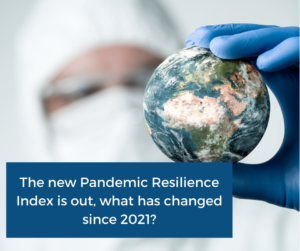Executive Summary
The Pandemic Resilience Index ranks 40 countries in terms of their health system’s resilience to the COVID-19 and alike crises. The Index looks at the following factors: vaccination approval, its drive, and time lags that have put brakes on it, critical care bed capacity, and mass testing.
Introduction
When the first case of COVID-19 was detected in China in December 2019, the world did not set off alarm bells right away. Along with the World Health Organisation (WHO)’s late reporting of the situation in Wuhan, it was also the prevailing global unpreparedness for a crisis of such extensive scope and, more generally, shock that drove the initial slow response. In particular, that concerns healthcare systems whose weaknesses have been dramatically exposed by COVID-19.
Although the pandemic was foreseeable, it was hardly reversible. Thanks to the fast-paced globalisation, especially in recent years, the world has reached an unprecedented level of connectedness. As a result, the virus had spread around the globe fast, and our healthcare systems had been put to an emergency test. Countries that started testing and then vaccinating as soon as possible, and who had sufficient, or close to sufficient, intensive care bed capacity, managed to better contain coronavirus. On the contrary, those that have failed, are experiencing a disaster that will forever remain a dark moment in the history of humanity. At the time of writing, India is struggling to contain the virus, and Ukraine has vaccinated only 1.96 per cent of its population (Hannah Ritchie et al., 2021).
While most of us have spent the majority of our year in lockdowns, incredible efforts have been made by pharmaceutical companies to develop vaccines, and the anticipation of gradual return to normality coupled with bitter awareness of likely future pandemics ahead inspired us to put together this Pandemic Resilience Index.
The Pandemic Resilience Index aims to provide an overview of global health resilience to pandemics such as coronavirus. Given that there is every reason to expect many more similar outbreaks in the future, it is crucial to reflect on our ability to envisage such threats, recognise them early on, respond without resorting to panic and rushed decision making, avoid shortages, identify and tackle regulatory barriers, and sustain the state of preparedness.
For this paper, health system resilience is defined as follows:
“Health system resilience describes the capacity of a health system to (a) proactively foresee, (b) absorb, and (c) adapt to shocks and structural changes in a way that allows it to (i) sustain required operations, (ii) resume optimal performance as quickly as possible, (iii) transform its structure and functions to strengthen the system, and (possibly) (iv) reduce its vulnerability to similar shocks and structural changes in the future” (EU Expert Group on Health Systems Performance Assessment, 2020).
Research Note: We strive to improve the quality of the underlying data of this index and aim to refine its methodology moving forward. The period of data ranges between 2018 and 2021. In terms of the number of ICUs, we ask the readers to acknowledge difficulties collecting this particular dataset and, to keep in mind, that there might be a minor margin of error. However, this is unlikely to meaningfully affect the final results. Regarding the testing, we calculated the average of daily tests per thousand based on the data provided by Our World in Data. The final dataset also includes the number of ventilators per 100 thousand people, although due to conflicting, or incomplete data, we didn’t include it in the final ranking.
AUTHORS:
MEDIA HITS
UAE tops COVID resilience rankings
- January 31, 2022
- Pandemic Resilience Index, Recent Media














